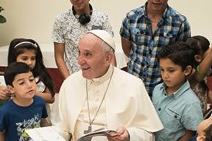Krakow: interfaith gathering ends with appeal for peace

St Francis of Assisi
"We are led onwards by the memory of the Second World War, the prophesy of John Paul II, as pilgrims of peace, establishing a new season of dialogue with patience and audacity, uniting those who hate or are indifferent - all peoples - in peace!" These words form the conclusion of the Peace Appeal read at the close of the international meeting: The Spirit of Assisi - Faiths and Cultures in Dialogue,' promoted by the Archdiocese of Krakow and the Community of Sant'Egidio, which took place in Krakow September 6-8.
The text reads: "We, as men and women of different religions, have come together in the old city of Krakow, Poland, 70 years after the outbreak of the Second World War: to pray, to dialogue, to foster a humanism of peace. We pay homage to the memory of John Paul II, a son of this land. He was a master of dialogue and a strong witness to the sacredness of peace, capable of bringing a vision in difficult times: the spirit of Assisi."
The document recalls that unfortunately, "the bitter lesson of the Second World War has been forgotten," even though it "was a terrible tragedy in human history. So much pain cannot be forgotten!" The encounter in Krakow was an occasion to examine "the pain of our world": peoples in war, the poor, the horror of terrorism, victims of hate, entire peoples suffering in poverty, the many who are missing, kidnapped, or live in insecurity. Our world is also "disoriented by the crisis of a market that believed itself to be omnipotent and a globalization that is often lacking in soul and face. Globalization is an historic occasion, although many have wished to live it a clash between civilizations and religions."
The appeal highlights that "there is no peace for the world, when dialogue among peoples dies out," and the various religions gathered in Krakow, in their differences, "cry out in unison that a world without spirit will never be human. They indicate the way to return to God, who is the origin of peace. Spirit and dialogue will give life to this globalized world! A world without dialogue would be a slave to hate and fear of others. The religions do not desire war and do not wish to be used for war. To speak of war in the name of God is an atrocity. No war is ever holy. Humanity is always set back by violence and terror."
Only dialogue is the great alternative to war: "Nothing is ever lost with dialogue. Dialogue writes history better, while clashes always open an abyss. Dialogue is the art of living together. Dialogue is the gift we want to give to the 21st century."
The Archbishop of Krakow, Cardinal Stanislaw Dziwisz, in his address in the Final Ceremony, highlighted that: "no religion and no faith can act as the spark for conflicts, violence, and wars. The name of every religion is peace, because peace is the name of God. The participants to the Congress did not meet to compete and fight. They met to build together mutual bonds of fraternity and reconciliation, which the work of peace stands upon. We are grateful that the call for peace has risen to heaven from Krakow, city of peace. It is the hometown of the pilgrim of peace, John Paul II, who left this city to serve humankind and proclaim peace to a troubled world."
The founder of the Community of Sant'Egidio, Andrea Riccardi, said: "for more than twenty years, following the trail of John Paul II, we have turned into pilgrims of peace in many cities of the world, to bear witness to the holiness and beauty of peace. Twenty years ago we were in Warsaw. But we have not grown weary, even though somebody's steps have grown heavier over the years; rather a conviction was born in us, particularly after 11 September 2001, that the world needs dialogue among religions. The fruit of dialogue is that we have not surrendered to the spell of violence, and to the seduction of contempt and hatred. The fruit of dialogue is that we did not despair, nor were we intimidated. The fruit of dialogue is that we continue to walk." Lastly, Riccardi defined a commitment, what he called "a dream": "Seventy years after World War II, after the disappointment caused by the global economic crisis, it is time for a humanism of peace and dialogue to be born again, capable of giving a soul to this globalised and fragmented world. We shall continue!"
Source: Fides

















